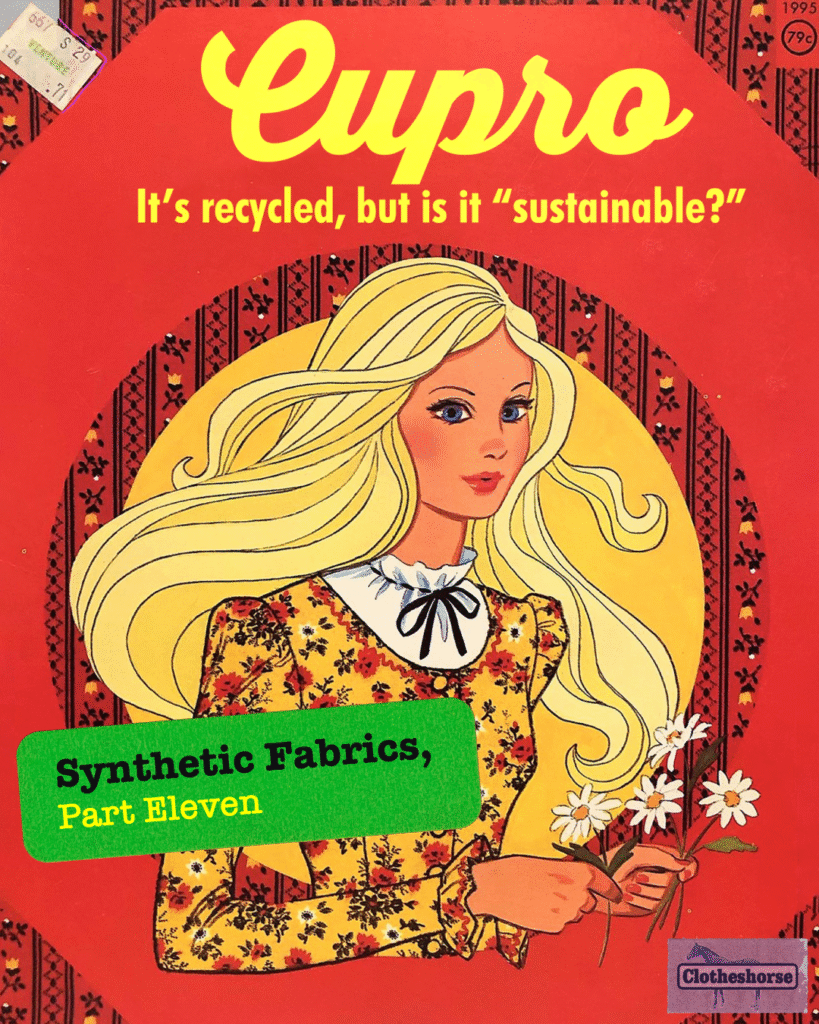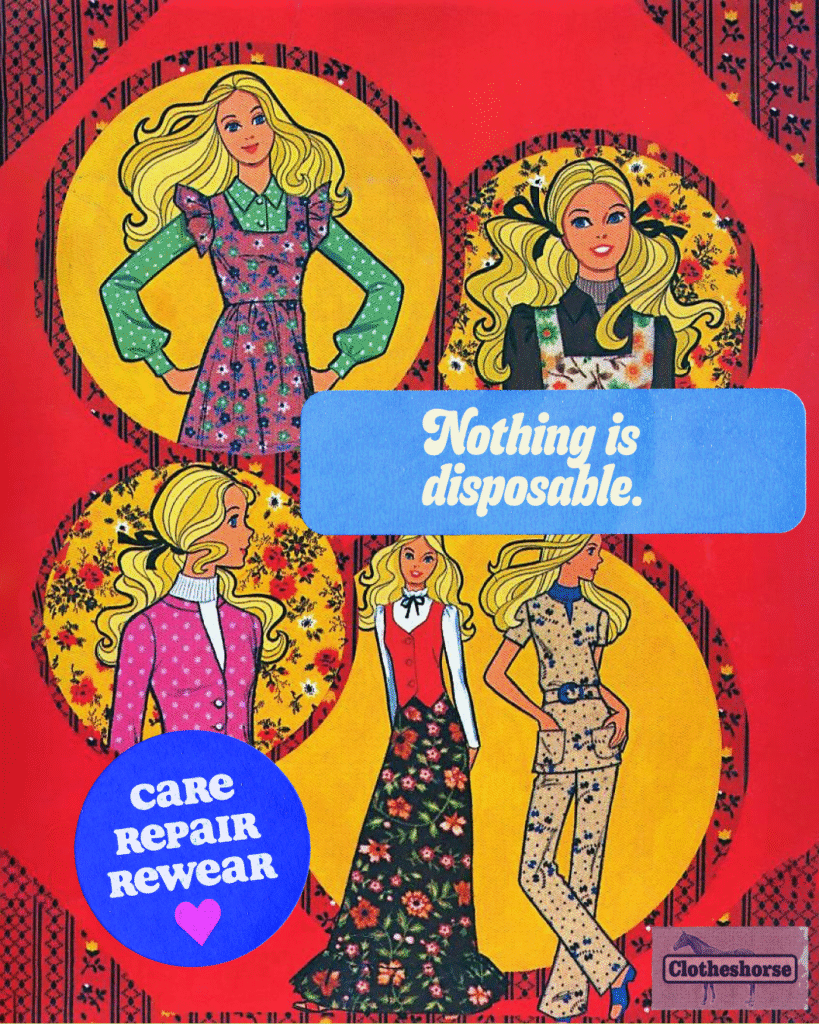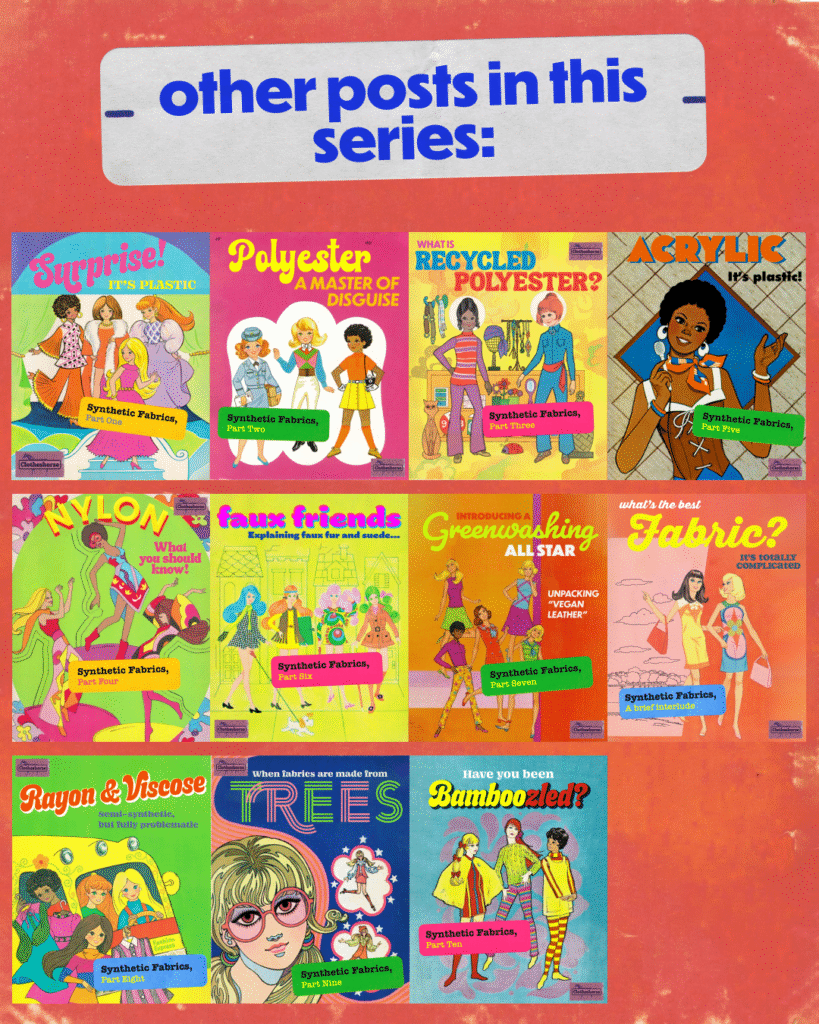
Holy macaroni, I thought I was going to break my brain trying to get to the bottom of the truth about cupro…mostly because I had to dig (and dig some more) to get past the a mountain of articles and blog posts that were all referencing the same ChatGPT sources. It was rough.
But here it is! This is part 11 of 12 in the synthetic fabrics series…yep, only one left to go and it’s a banger…ELASTANE! Coming next week!
And that brings me to this:
I’ve gotten a lot of messages pushing back on my assertion that no fabric/yarn lets us overconsume without repercussions for the planet and every living thing on it.
But I’m standing by it.
Sure, some fabrics are more sustainable than others…but when we’re churning out and consuming massive amounts of anything, it all becomes destructive. That’s especially true with an industry that prioritizes profitability over everything else.
Crops for fabric take up farmland, use up water, and rely on exploited labor. Animal fibers aren’t exempt either: scaling up wool, alpaca, etc, to meet the current consumer demand still requires land, water, and in a profit-driven system, that leads to deforestation and abuse of animals. Seriously, ask me about the video PETA sent me this summer about animal abuse in a farm allegedly used by Icebreaker.
We have to change up our habits. Period. We cannot continue to buy more clothes than we need, wear them a few times, then buy some more. There is no “green” fabric that cancels out overconsumption. The good news? All of you are already doing that! We just need to get more people involved (and we WILL)!
Cupro can refer to two things (and the distinction is important):
a shorter, cuter name for “cuprammonium rayon.” Also sometimes called “ammonia silk” or just “vegan silk.” However, polyester fabrics are sometimes called “vegan silk,” too.
the Bemberg fiber (a type of cupro) made exclusively by Asahi KASEI Fibers & Textiles in Japan.
The difference here? Bemberg is made in a closed loop process that minimizes chemical use and adheres to safety protocols. The production process is very transparent.
Cupro , cupra, ammonia silk, and vegan silk are technically the same kind of fabric, but made under less transparent conditions by other factories.
The good news: cupro is made from cotton waste–either discarded t-shirts/other 100% cotton clothing or from linter (silky cotton fibers that are often discarded because they are too small to spin). Linter is a byproduct of cottonseed oil manufacturing. Minimizing cotton waste is a good thing because growing cotton requires a massive amount of water.
The less-good news: The process of creating cupro requires some serious chemicals that are toxic to all living things if not disposed of properly.
Silk-like hand feel, fine texture, sheer weight.
A vegan alternative to silk.
Biodegradable
Highly flammable, ignites easily at temperatures above 180 degrees.
When ignited it leaves behind a residue containing significant concentrations of copper.
The cotton waste is mixed with ammonium and copper. The two elements, when combined with the cellulose of the cotton waste, turn into a new substance.
This new substance is dropped into caustic soda and then extruded into strings using a spinneret.
Next, these strings are dropped into a series of “hardening” chemical baths that remove the ammonia, copper, and caustic soda, while also solidifying the cellulose.
First things first: Cupro CAN be a pretty great sustainable fabric option if it’s made in a closed loop system, where chemicals are recovered and reused. However, the only manufacturer doing this is Asahi KASEI in Japan under the trademark Bemberg. This has somehow been translated across the internet as “the only company in the world making cupro is Asahi KASEI.” This is not true.
The vast majority of cupro is made in China. Producing it is VERY cheap because cotton waste is plentiful and priced to move! There is little-to-no visibility into most fabric production in China, so there is no way of knowing if these textiles are made ethically and responsibility.
Cupro is no longer produced in the United States because manufacturers could not meet basic air and water regulations.
The chemicals involved in cupro production are harmful for humans, animals, and plants. If they are disposed of properly, they are less problematic, but the lack of transparency in the supply chain means we don’t know what is happening to these chemicals.
To be sure about your cupro clothing, ask brands to confirm that they are using the Bemberg cupro.
Cupro CAN be made from post consumer textiles (assuming that they are 100% cotton).
This means that with a proper closed loop system (like the one used by Asahi KASEI), cupro could be a good circular option for the world. It’s not perfect (after all, all of that manufacturing does require energy and generate emissions), but it’s a start.
Also, manufacturing cupro is not as water-intensive as cotton production. It’s not a license to overconsume clothing, but it could at least make the industry a little but more sustainable.
Hand wash or use the delicate cycle. Either way, wash with cold water.
Avoid harsh wringing or twisting.
Skip the dryer, and opt for air drying (either on a washline or on a drying rack)
For wrinkles, iron on the lowest setting or use a steamer. Or just hang it in the bathroom while you shower!

P.S. graphics are from the 1978 paper doll book CALICO CATHY.

The last thing I want to add here: odds are good that your favorite small business isn’t planning on buying an election, gutting the federal government, or blasting rockets into the atmosphere. So shop small when you can!
If you want to share your opinion/additional thoughts on the subjects we cover in each episode, feel free to email, whether it’s a typed out message or an audio recording: [email protected]
Slow Fashion Academy is a size-inclusive sewing and patternmaking studio based in Philadelphia, Pennsylvania. Designer and fashion professor Ruby Gertz teaches workshops for hobbyists and aspiring designers, so that anyone can learn the foundational skills of making, mending, and altering their own clothes. Ruby also provides professional design and patternmaking services to emerging slow fashion brands, and occasionally takes commissions for custom garments and costume pieces. She has also released several PDF sewing patterns for original designs under her brands Spokes & Stitches, and Starling Petite Plus. Check the schedule for upcoming workshops, download PDF sewing patterns, and learn about additional sewing and design services at www.slowfashion.academy.
Thumbprint is Detroit’s only fair trade marketplace, located in the historic Eastern Market. Our small business specializes in products handmade by empowered women in South Africa making a living wage creating things they love like hand painted candles and ceramics! We also carry a curated assortment of sustainable/natural locally made goods. Thumbprint is a great gift destination for both the special people in your life and for yourself! Browse our online store at thumbprintdetroit.com and find us on instagram @thumbprintdetroit.
Picnicwear: a slow fashion brand, ethically made by hand from vintage and deadstock materials – most notably, vintage towels! Founder, Dani, has worked in the industry as a fashion designer for over 10 years, but started Picnicwear in response to her dissatisfaction with the industry’s shortcomings. Picnicwear recently moved to rural North Carolina where all their clothing and accessories are now designed and cut, but the majority of their sewing is done by skilled garment workers in NYC. Their customers take comfort in knowing that all their sewists are paid well above NYC minimum wage. Picnicwear offers minimal waste and maximum authenticity: Future Vintage over future garbage.
Shift Clothing, out of beautiful Astoria, Oregon, with a focus on natural fibers, simple hardworking designs, and putting fat people first. Discover more at shiftwheeler.com
High Energy Vintage is a fun and funky vintage shop located in Somerville, MA, just a few minutes away from downtown Boston. They offer a highly curated selection of bright and colorful clothing and accessories from the 1940s-1990s for people of all genders. Husband-and-wife duo Wiley & Jessamy handpick each piece for quality and style, with a focus on pieces that transcend trends and will find a home in your closet for many years to come! In addition to clothing, the shop also features a large selection of vintage vinyl and old school video games. Find them on instagram @ highenergyvintage, online at highenergyvintage.com, and at markets in and around Boston.
St. Evens is an NYC-based vintage shop that is dedicated to bringing you those special pieces you’ll reach for again and again. More than just a store, St. Evens is dedicated to sharing the stories and history behind the garments. 10% of all sales are donated to a different charitable organization each month. New vintage is released every Thursday at wearStEvens.com, with previews of new pieces and more brought to you on Instagram at @wear_st.evens.
Deco Denim is a startup based out of San Francisco, selling clothing and accessories that are sustainable, gender fluid, size inclusive and high quality–made to last for years to come. Deco Denim is trying to change the way you think about buying clothes. Founder Sarah Mattes wants to empower people to ask important questions like, “Where was this made? Was this garment made ethically? Is this fabric made of plastic? Can this garment be upcycled and if not, can it be recycled?” Signup at decodenim.com to receive $20 off your first purchase. They promise not to spam you and send out no more than 3 emails a month, with 2 of them surrounding education or a personal note from the Founder. Find them on Instagram as @deco.denim.
The Pewter Thimble Is there a little bit of Italy in your soul? Are you an enthusiast of pre-loved decor and accessories? Bring vintage Italian style — and history — into your space with The Pewter Thimble (@thepewterthimble). We source useful and beautiful things, and mend them where needed. We also find gorgeous illustrations, and make them print-worthy. Tarot cards, tea towels and handpicked treasures, available to you from the comfort of your own home. Responsibly sourced from across Rome, lovingly renewed by fairly paid artists and artisans, with something for every budget. Discover more at thepewterthimble.com
Blank Cass, or Blanket Coats by Cass, is focused on restoring, renewing, and reviving the history held within vintage and heirloom textiles. By embodying and transferring the love, craft, and energy that is original to each vintage textile into a new garment, I hope we can reteach ourselves to care for and mend what we have and make it last. Blank Cass lives on Instagram @blank_cass and a website will be launched soon at blankcass.com.
Vagabond Vintage DTLV is a vintage clothing, accessories & decor reselling business based in Downtown Las Vegas. Not only do we sell in Las Vegas, but we are also located throughout resale markets in San Francisco as well as at a curated boutique called Lux and Ivy located in Indianapolis, Indiana. Jessica, the founder & owner of Vagabond Vintage DTLV, recently opened the first IRL location located in the Arts District of Downtown Las Vegas on August 5th. The shop has a strong emphasis on 60s & 70s garments, single stitch tee shirts & dreamy loungewear. Follow them on instagram, @vagabondvintage.dtlv and keep an eye out for their website coming fall of 2022.
Country Feedback is a mom & pop record shop in Tarboro, North Carolina. They specialize in used rock, country, and soul and offer affordable vintage clothing and housewares. Do you have used records you want to sell? Country Feedback wants to buy them! Find us on Instagram @countryfeedbackvintageandvinyl or head downeast and visit our brick and mortar. All are welcome at this inclusive and family-friendly record shop in the country!
Located in Whistler, Canada, Velvet Underground is a “velvet jungle” full of vintage and second-hand clothes, plants, a vegan cafe and lots of rad products from other small sustainable businesses. Our mission is to create a brand and community dedicated to promoting self-expression, as well as educating and inspiring a more sustainable and conscious lifestyle both for the people and the planet. Find us on Instagram @shop_velvetunderground or online at www.shopvelvetunderground.com
Selina Sanders, a social impact brand that specializes in up-cycled clothing, using only reclaimed, vintage or thrifted materials: from tea towels, linens, blankets and quilts. Sustainably crafted in Los Angeles, each piece is designed to last in one’s closet for generations to come. Maximum Style; Minimal Carbon Footprint.
Salt Hats: purveyors of truly sustainable hats. Hand blocked, sewn and embellished in Detroit, Michigan.
Republica Unicornia Yarns: Hand-Dyed Yarn and notions for the color-obsessed. Made with love and some swearing in fabulous Atlanta, Georgia by Head Yarn Wench Kathleen. Get ready for rainbows with a side of Giving A Damn! Republica Unicornia is all about making your own magic using small-batch, responsibly sourced, hand-dyed yarns and thoughtfully made notions. Slow fashion all the way down and discover the joy of creating your very own beautiful hand knit, crocheted, or woven pieces. Find us on Instagram @republica_unicornia_yarns and at www.republicaunicornia.com.
Cute Little Ruin is an online shop dedicated to providing quality vintage and secondhand clothing, vinyl, and home items in a wide range of styles and price points. If it’s ethical and legal, we try to find a new home for it! Vintage style with progressive values. Find us on Instagram at @CuteLittleRuin.